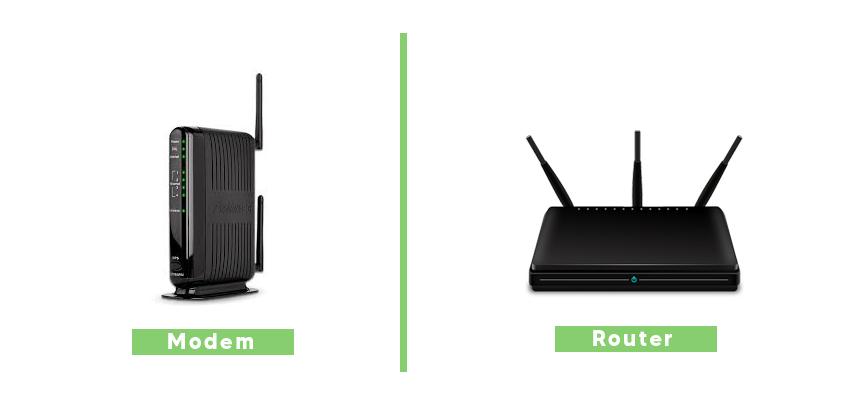
What's the Difference of a Modem and a Router?
Posted May 18, 2020, 11:52 a.m. by Emil S.If you’ve been getting online for a while, you’ve likely heard of the words “router” and “modem” being tossed around. You might also be confused as to what exactly it is that a router and modem do, are both the same thing?
We’ll help you figure it out, but to answer that question first – no. They are two separate things.
Devices such as your smartphone or a computer, connect to a router locally, either with Ethernet cables or wirelessly through Wi-Fi signals, to form a network of devices. The router then connects this network to a modem so that all of those devices can access the Internet simultaneously.
What’s a Modem’s Function?
In effect, your modem is a bridge that connects your home network established with your router to the Internet. However, you can’t just buy a modem and expect it to grant you an Internet connection instantly. You must first sign up with an ISP (Internet Service Provider) before you can use it, and they usually provide one for you.
Nowadays, you can connect to the Internet via the DSL (Digital Subscriber Line) of your telco, or through cable, fiber, or satellite from other service providers.
What they’ll do is assign your router a unique IP address. That will allow those devices connected to it to reach other IP addresses, usually of websites, scattered all over the Internet, and interact with them.
What’s Does a Router Do?
When you boot up your router, one of the first things it does is to search for a modem connection and let your computer communicate with that modem. Usually, a router and modem, attach on either end of a cable plugged into their respective Ethernet ports.
The router can be used privately in a home network connecting a few devices, or in an office. It is also used more extensively in public networks owned by businesses, like a café or hotel, where several more devices can connect to their network.
In some cases, a router’s Wi-Fi signal will suffer from interference coming from other devices or appliances, or blocked by obstructions such as walls or floors. You may want to think of buying an extender to eliminate dead spots in your homes and increase your router’s reach.
Your router also acts as a gatekeeper or sentry that keeps your data secure from any intrusion. These intrusions can pass through your modem or come from other devices trying to tap into your network. Each network is protected by a password and firewall and has firmware with all the necessary security protocols.
A Router and Modem Work Together
The fact is, if you only have a single computer and no other devices, you don’t need a router. You can attach your computer directly to the modem and log on to the Internet from there. Modern smart devices like mobile phones have their built-in modem and can let users access the Internet from anywhere around the world where there’s a signal.
The router is only needed when you have multiple devices that need to connect to the modem. What it does essentially is to “route” data signals exchanged between a network of devices connected to it and a modem.
It does the vital job of connecting multiple devices to form a Wi-Fi or wired network and manage their data exchanges with the modem.
Router and Modem Combination
For a majority of users, having a #route router and modem on a single device is more convenient. It’s typical for an ISP to hand you a box that lets your devices share a connection and simultaneously access the Internet. You can even disable the Wi-Fi connection and plug in a single computer to that box.
However, it’s worth considering buying a router instead of using the one from your ISP so you can be sure to get the latest hardware and software available. It also lets you tweak and mod your router more extensively to get a boost in performance.
If, for instance, you want to enjoy the benefits of a fast 802.11ac Wi-Fi, but your ISP’s box can’t handle it, you can purchase another router that can.
